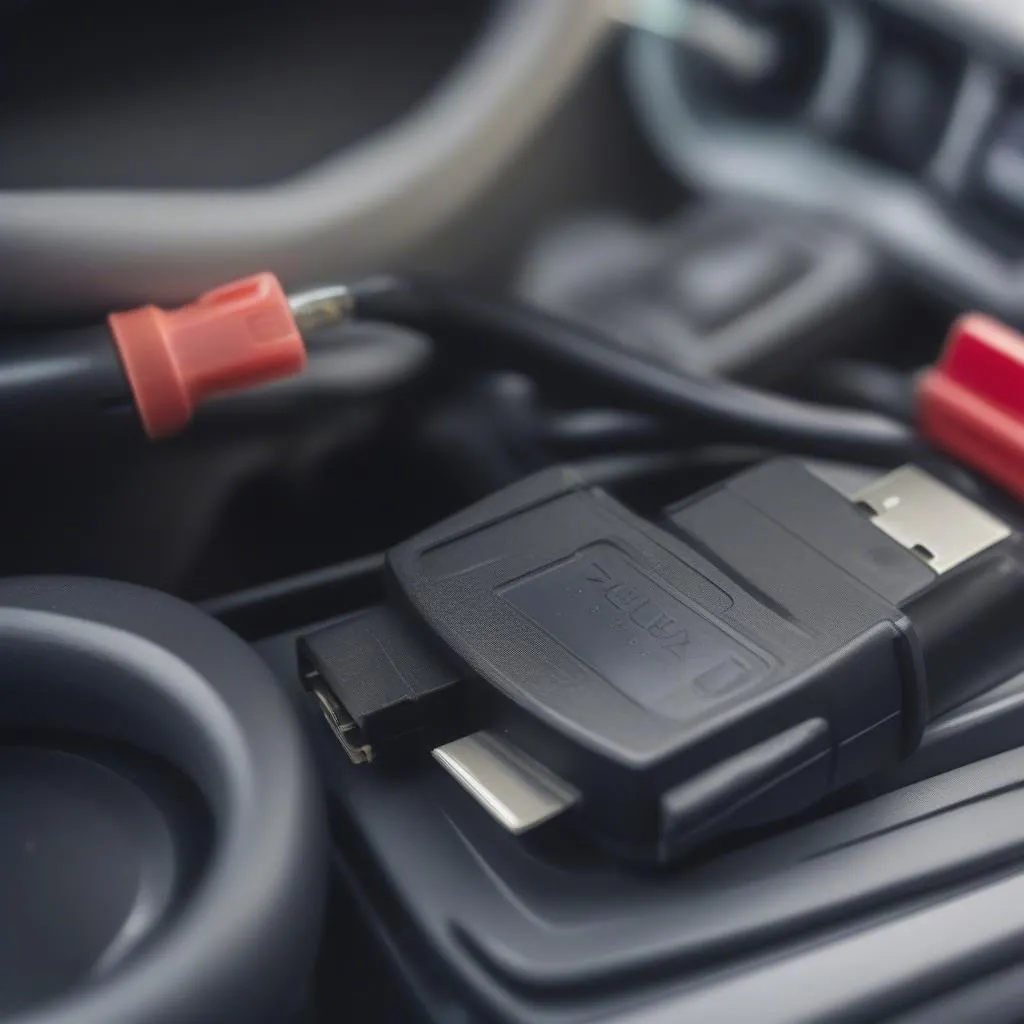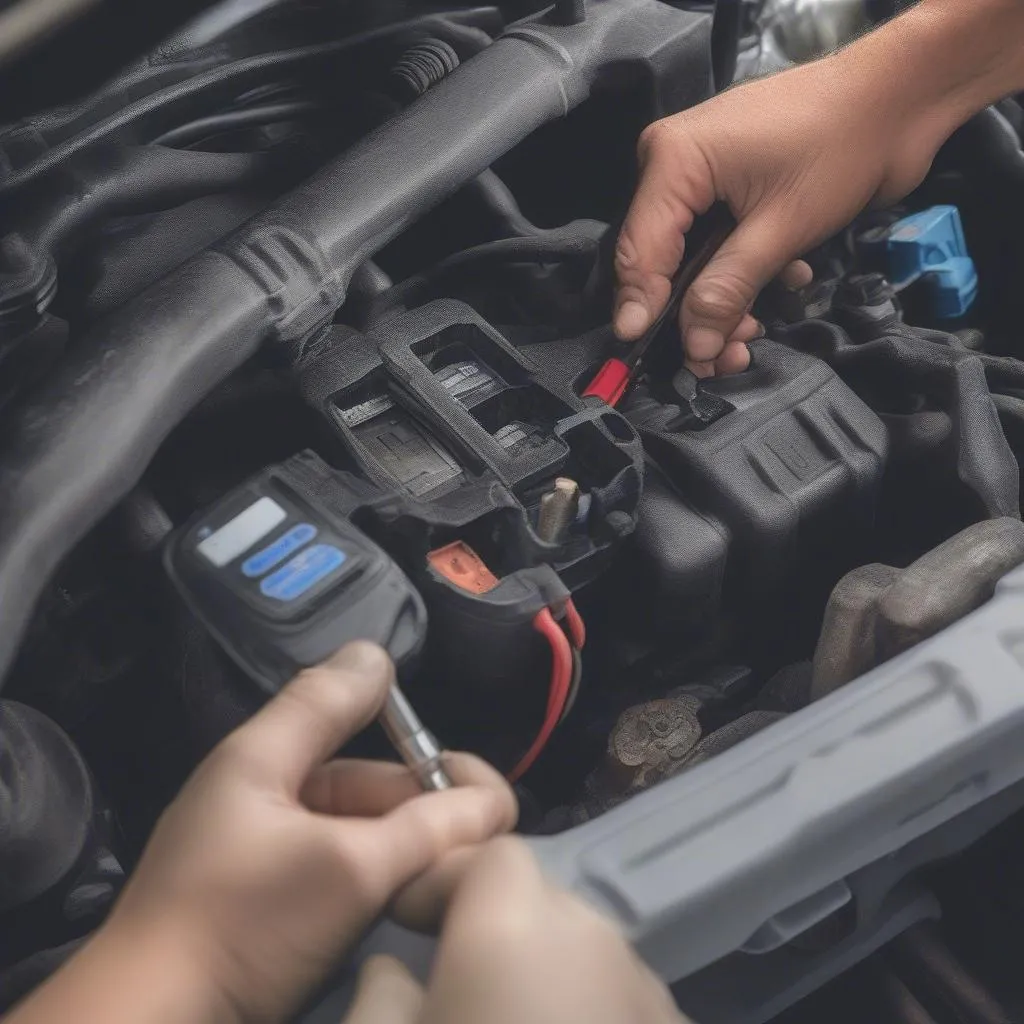Imagine this: you’re driving down the road, enjoying the smooth ride in your Acura, when suddenly, the check engine light pops on. You pull over, check the manual, and it suggests using an OBD2 scanner to diagnose the problem. You grab your trusty scanner, plug it into the OBD2 port, and… nothing. You try again, and again, but your scanner won’t connect. What’s going on? The culprit might be a damaged or faulty OBD2 connector.
In this article, we’ll dive into the world of Acura OBD2 connectors and how to handle replacement when needed. We’ll explore the importance of this connector, common signs of failure, the process of replacement, and even answer some frequently asked questions.
What is an OBD2 Connector and Why is It Important?
The OBD2 (On-Board Diagnostics II) connector is a standardized port found on most vehicles manufactured after 1996, including Acura models. Think of it as the gateway to your vehicle’s computer system. It allows mechanics, technicians, and even DIY enthusiasts to access and interpret diagnostic information stored within the car’s computer. This information can help identify potential problems, monitor engine performance, and even assist with repairs.
Acura OBD2 connectors are typically located under the dashboard, near the steering column. They have a standard 16-pin configuration, making them compatible with a wide range of diagnostic tools and scanners. This universal compatibility has revolutionized car diagnostics, enabling efficient troubleshooting and repair.
Why Your Acura’s OBD2 Connector Might Be Failing
Like any electrical component, an OBD2 connector can wear out over time. Here are a few common signs that yours might be going bad:
- Intermittent or No Connection: The most obvious sign of a failing OBD2 connector is an intermittent or no connection with your diagnostic scanner. You might notice the scanner connects sometimes, but other times it fails to recognize the vehicle.
- Loose or Bent Pins: A close inspection of the OBD2 connector might reveal loose or bent pins. These pins are crucial for establishing a secure connection with the scanner. Over time, they can become damaged from repeated insertion and removal of the scanner.
- Corrosion: Corrosion can build up on the pins and contacts within the OBD2 connector, hindering signal transmission. This is more common in areas with high humidity or salty air.
- Physical Damage: Accidents, bumps, or even rough handling can damage the OBD2 connector. This can cause the connector to detach or break the internal circuitry.
Replacing Your Acura’s OBD2 Connector: A Step-by-Step Guide
If you’re experiencing issues with your OBD2 connector, replacing it is a relatively straightforward process. Keep in mind that this is a general guide. Specific procedures may vary depending on your Acura model year and engine. Always consult your owner’s manual or a reputable repair guide for detailed instructions tailored to your vehicle.
Here’s a basic outline:
-
Gather Your Tools: You’ll need a few essential tools:
- A socket wrench set
- A Phillips screwdriver
- A new OBD2 connector (make sure it’s compatible with your Acura model)
-
Locate the Connector: As mentioned earlier, the OBD2 connector is typically found under the dashboard, near the steering column. You might need to remove some panels or trim pieces to gain access.
-
Disconnect the Battery: Before working on any electrical components, it’s essential to disconnect the negative terminal of your car battery to prevent electrical shocks.
-
Remove the Old Connector: Depending on your Acura model, the connector may be held in place by a few screws or a plastic clip. Carefully remove the old connector, being mindful of any wiring or connectors attached.
-
Connect the New Connector: Connect the new OBD2 connector in the same position as the old one. Make sure the pins align correctly.
-
Reconnect the Battery: Once the new connector is securely in place, reconnect the negative battery terminal.
-
Test the Connection: After reconnecting the battery, use your diagnostic scanner to test the connection. It should now be able to communicate with your Acura’s computer system.
Expert Advice: A Word from the Professionals
“Replacing an OBD2 connector isn’t rocket science, but it does require some mechanical aptitude and the right tools,” says Dr. Daniel Smith, a renowned automotive engineer specializing in electronic systems. “If you’re not comfortable working with car electrical systems, it’s best to take your Acura to a qualified mechanic.”
Common Questions about Acura OBD2 Connectors
Here are some questions that people often ask about Acura OBD2 connectors:
Where can I find a replacement OBD2 connector for my Acura?
You can typically find replacement OBD2 connectors for your Acura at local auto parts stores, online retailers like Amazon, or through Acura dealerships.
Can I use a generic OBD2 connector for my Acura?
While OBD2 connectors have a standard configuration, it’s crucial to use a connector designed specifically for your Acura model year and engine. Generic connectors may not have the correct pin layout and could damage your vehicle’s electrical system.
How often should I replace my OBD2 connector?
There’s no specific replacement schedule for OBD2 connectors. It depends on factors like the vehicle’s age, driving conditions, and how often you use the connector. However, if you notice any signs of wear or damage, it’s best to replace it as soon as possible.
Can I fix a damaged OBD2 connector myself?
If the damage is minor, such as bent or corroded pins, you might be able to repair it yourself. However, if the connector is physically damaged or has broken wires, it’s best to replace it.
Explore Other Tech Car USA Resources
You can find more helpful articles about your Acura’s diagnostic system on our website. Check out these related resources:
- 1999 Acura 3.2 TL OBD Location
- 1999 Acura 3.0CL P0740 OBD Trouble Code
- 04 Acura TL Can Not Communicate with OBD
- 2014 Honda Odyssey OBD Code B2038
Stay Connected
If you have any further questions about Acura OBD2 connectors or need help with diagnostics, don’t hesitate to contact us. We’re happy to assist you.
Whatsapp: +84767531508
Connect with us!
Let us know your thoughts and experiences with Acura OBD2 connectors in the comments section below. Share this article with fellow Acura owners who might find it helpful.
 Acura OBD2 Connector
Acura OBD2 Connector
 Replacing Acura OBD2 Connector
Replacing Acura OBD2 Connector
 Acura OBD2 Troubleshooting
Acura OBD2 Troubleshooting